Posted by Elena del Valle on June 26, 2015
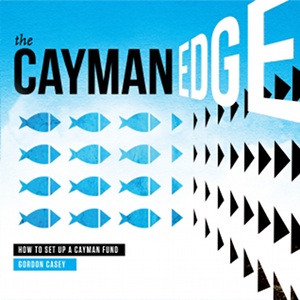
The Cayman Edge
Photos: cover Alex Nereuta, author Hans van der Post
Investors looking for opportunities that don’t follow the mainstream market trends sometimes choose independently managed private funds. That is one reason to buy into an offshore fund. Diversity is another, according to Gordon Casey, managing director of hedge fund consultancy Front Shore.
“While everybody is hoping for returns that are higher than the market, the truth is that there is great value in having an investment that is completely independent from the regular investment options,” Casey said by email when asked about the advantages of Cayman Islands investments.
“Diversity is a goal in and of itself and that’s the main reason. Having said that, fund structures in the Cayman Islands are used for many other purposes – including the structuring of private funds only intended for a very small group of people who want to invest together, family funds where all of the assets owned by a family are put into the fund structure and the family heirs, as such, are given shares in the fund. And lastly, for people who live in geographic areas with strict exchange controls but have made substantial gains internationally and do not want to repatriate their funds yet, a fund offers an efficient way to invest those gains outside of their core business – whether for private, corporate or family planning purposes.”
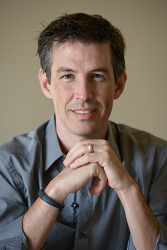
Gordon Casey, author, The Cayman Edge
In The Cayman Edge How to Set Up a Cayman Edge Fund (OneWord Publishing, $19.99), a 169-page softcover book published in 2014 he discusses the subject in detail. He wrote the book for fund managers wishing to setup a fund in the Cayman Islands, although he also hopes it serves as a useful tool for students of finance seeking information about the hedge fund industry in general, and new entrants to the industry who want to get a head start. The book is illustrated in color and divided into 18 chapters, two introductions and eight appendices.
“When I entered the industry in 2001 there was very little in the way of guides or literature on funds, and these days you can find everything online but it’s scattered across the websites of industry organisations, law firms, administrators and general interest articles,” Casey said. “The book is an attempt to consolidate all of the information (with pictures!) into one place – the book that I wish I had been given when I first started and a book that I can continue to use as a reference tool myself.”
While many of the more successful funds require a minimum of one million dollars to start, the most common funds require a minimum investment of $100,000, he explained by email. In the book, he describes six types of funds and seven service providers. Casey has been running Front Shore since 2004.
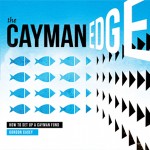
Click to buy The Cayman Edge
Comments:
Filed Under: Books
Posted by Elena del Valle on June 17, 2015
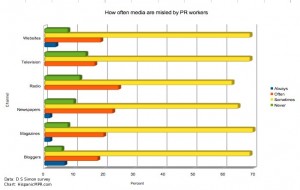
Survey: How often PR workers mislead media – click to enlarge
A recent report from a digital media and blogger placement company indicates that the relationship between public relations workers and media is poor. According to The Media Influencers Report of digital journalists, 90 percent of digital journalist respondents said they have been misled by public relations workers. Almost a quarter of them said such behavior happens often.
On average three out of four respondents said they use third party video. The highest percent among media channels, perhaps not surprisingly, was television where 93 percent of respondents said they use video provided by a third party. At the same time, when it came to video provided by public relations practitioners respondents indicated proper disclosure of content was a concern.
Twitter and Facebook top the list of social networks journalist respondents said they rely on for story ideas. Other sites that follow, they said, are LinkedIn, YouTube and Instagram.
The Media Influencers Report, the result of an online survey via Survey Monkey of 300 reporters and producers at TV, radio, newspaper, magazine, web media and bloggers, was recently released by D S Simon.
Posted by Elena del Valle on June 12, 2015
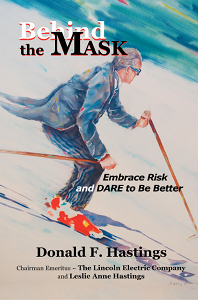
Behind the Mask
Photos: Xlibris Publishing
Before retiring Donald F. Hastings led international conglomerate The Lincoln Electric Company out of a severe financial crisis into record sales and profits. He is convinced his success is due to unexpected strategies of sharing the risk, respect and wealth with all employees.
In Behind the Mask: Embrace Risk and Dare to Be Better (Xlibris Publishing, ) a 207-page softcover memoir penned by his daughter Leslie Anne Hastings, he discusses his career path, shares his opinions about good management strategies, and challenges the modern views of corporate America. They wrote the book for “anyone who is struggling with a person or situation in his/her life that seems insurmountable. There is always a solution.”
“I may be David goading Goliath, but I believe layoffs, in general, are a sign of catastrophic failure on the part of management,” Hastings said in a press release. “To please Wall Street, we are dehumanizing business to a point that is unconscionable. It’s lazy and it’s bad business. I believe human beings are the single greatest resource a company has,” Hastings said. “Of course there’s a risk in taking care of your people, but being creative and taking risks is what inspired management is all about!”
When asked what the biggest surprise from the publication of the book was Leslie Anne said by email, “That the book was so well received on so many levels. Most people read the book in one sitting! Everyone who reads it takes away something different- from ideas and philosophy to courage and humor. It’s a really fun read!”
Before retiring Donald F. Hastings led international conglomerate The Lincoln Electric Company out of a severe financial crisis into record sales and profits. He is convinced his success is due to unexpected strategies of sharing the risk, respect and wealth with all employees.
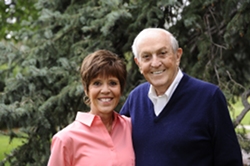
Donald and Leslie Anne Hastings, authors, Behind the Mask
According to his biography, Hastings, chairman emeritus, The Lincoln Electric Company, was dubbed the Silver-Tongued Mesmerist by his customers. Leslie Anne Hastings, a graduate of Stanford University, was the voice Behind the Mask.
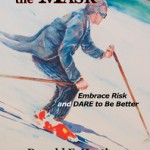
Click to buy Behind the Mask
Comments:
Filed Under: Books
Posted by Elena del Valle on June 4, 2015
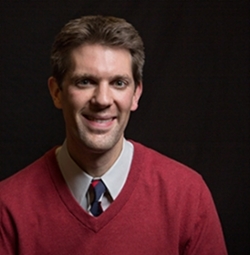
Temple Northup, Ph.D., assistant professor, University of Houston
Photo: University of Houston
Two academics who studied the effects of media in the United States and Austria believe longterm exposure to news may influence racial bias. The results of their three studies were recently published in a 20-page article titled Effects of Long-Term Exposure to News Stereotypes on Implicit and Explicit Attitudes in the International Journal of Communication.
Temple Northup, assistant professor at the University of Houston’s Jack J. Valenti School of Communication, conducted the United States portion of the study while Florian Arendt at the University of Munich in Germany conducted the research in Austria. The study in the United States focused on possible bias toward African-Americans while the two studies in Austria addressed possible bias against foreigners. The researchers believe the influence of television news was likely greater than print news among study participants.
“The two countries were selected due to access of available data for a comparable news stereotype that exists in both countries,” said Northup in a press release. “In the U.S., a large body of research indicates crime is overrepresented on local television news relative to the actual amount of crime that actually occurs in a community. Previous content analyses conducted by researchers at the University of Michigan and the University of California, Santa Barbara have shown that that African-Americans are overrepresented as criminals on local television news when compared to their actual crime rates. In Austria, research has suggested foreigners are overrepresented as criminals in tabloid-style daily newspapers.”
In the first study in the United States 316 participants completed the Implicit Association Test (IAT), a controversial tool used in psychology to measure hidden bias people may have but are unwilling or unable to report. After completing the IAT, participants answered a question about their explicit (conscious) attitudes towards African-Americans, as well as how many hours of local television news they watch per day.
“The two countries were selected due to access of available data for a comparable news stereotype that exists in both countries,” said Northup. “In the U.S., a large body of research indicates crime is overrepresented on local television news relative to the actual amount of crime that actually occurs in a community. Previous content analyses conducted by researchers at the University of Michigan and the University of California, Santa Barbara have shown that that African-Americans are overrepresented as criminals on local television news when compared to their actual crime rates. In Austria, research has suggested foreigners are overrepresented as criminals in tabloid-style daily newspapers.”
There were 489 participants in the first Austria study for which researchers used the same data procedure. Respondents reported how many days per week they read the specific newspaper under investigation. The researchers concluded that exposure to the tabloid-style daily newspaper did not increase the negativity of implicit attitudes. There were 470 participants in the second Austria study. The academics concluded that reading content specifically about crime had a significant effect on implicit attitudes toward foreigners among respondents who said they often read crime articles.
While stereotyping, prejudice, and discrimination are found across the world the impact of media on consumers remains to be clearly defined. The researchers concluded more studies are necessary to better understand the issues “before an earnest attempt to reduce these negative outcomes can be undertaken.”

















